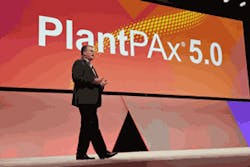“They’re part of the family, they preserve your investment in our tools and training.” Rockwell Automation’s Dave Rapini on the company’s new purpose-built process controllers scheduled to launch this summer in conjunction with PlantPAx V5.
At this week’s Process Solutions User Group meeting in Chicago, Rockwell Automation showed an early trailer for what the company promises will be this summer’s blockbuster release: PlantPAx V5.
Timed to coincide with the 10th anniversary of PlantPAx introduction, Version 5 will substantially advance Rockwell Automation’s ability to enable the process enterprise, simplify operations, optimize production and support its customers’ lifecycle needs, according to Jim Winter, director of Rockwell Automation’s global process business.
“Industry 4.0 is upon us, and things are really happening,” Winter said, addressing the more than 1,000 PSUG attendees from 16 countries around the world. “But challenges remain, many arising from how process control has been done in the past.”
Much process data remains segregated in silos, making it difficult, expensive and sometimes impossible to pull together, Winter said. “Standards are helping—foundational ones such as for communications—but also those at the system level, such as the efforts of NAMUR and the Open Process Automation Forum to modularize, open and standardize process automation.”
PlantPAx V5 continues Rockwell Automation’s drive to address these issues, and to reduce the lifecycle costs of automation, Winter said, ceding the dais to David Rapini, PlantPAx business manager, to fill in more details.
Still modern, 10 years on
PlantPAx remains a uniquely modern distributed control system (DCS), Rapini reminded the PSUG audience. “The tenets of the modern DCS include plantwide control—a common technology stack from lowest level skid to DCS,” Rapini said. “With a unified stack, skids integrate seamlessly and easily—it allows scalable and modular features, performance and price.”
“The modern DCS is also secure, open and information-enabled,” Rapini continued. “PlantPAx leverages industry standard Common Industrial Protocol (CIP)—from controllers to backplanes, all open. This means that a new device from anyone—as long as it complies with the ODVA specification—integrates cleanly.”
The modern DCS is also flexible in terms of delivery and support, Rapini added. “We can help, or you can use the local integrator down the road that knows your process best.”
Key features of Version 5, which is planned for release in the July 2020 time-frame, are native objects, reduced footprint, automatic diagnostics and integrated HART communications. The new system also comes analytics-enabled and is increasingly cybersecure, Rapini said. Perhaps most significantly, PlantPAx V5 will be introduced concurrently with two new purpose-built process controllers: the CompactLogix 5380 for skid applications and theControlLogix 5585, for DCS applications.
New members of the family
These two new “superset” process controllers are specifically designed for process applications, but “they’re part of the family, they preserve your investment in our tools and training,” Rapini said. “You spend too much time on basic automation tasks. Our intent to offload a lot of that basic work and free up your time to realize greater possibilities.”
With the new controllers, process-specific objects are now embedded in the firmware. This enforces consistency from unit to unit and plant to plant as well as exposing more internal capabilities. Multiple languages, for example, are supported at the firmware level, freeing up memory and processor capabilities. A side benefit of these embedded data models is that analytics developed for one situation are more transportable from one application to another.
The new controllers also communicate more efficiently, reporting by exception rather than by scheduled polling. This can result in dramatic reductions in data traffic, freeing up bandwidth for new data flows that promise only to increase in years to come. Rapini described one oil and gas application in which the need for redundant data servers was cut by 70% using the new communications method.
Another time-saving feature of the new controllers is automatic hardware diagnostics—no code required—for detecting connection faults, broken wires, short circuits, and motor over-temperature conditions.
Finally, V5 and the new controllers are in line with Rockwell Automation’s “all-in” support of the IEC 62443 cybersecurity standards. “We’ve been certified to the 4-1 part of the standard for our own development processes, and we're the first to have a controller certified to the standard’s 4-2 requirements,” Rapini said. “Also in the works for release this summer is a reference architecture in line with part 3-3 of the standard. With this reference architecture, if installed as recommend, “it’ll be a very short putt” to your own 3-3 certification, Rapini said.






